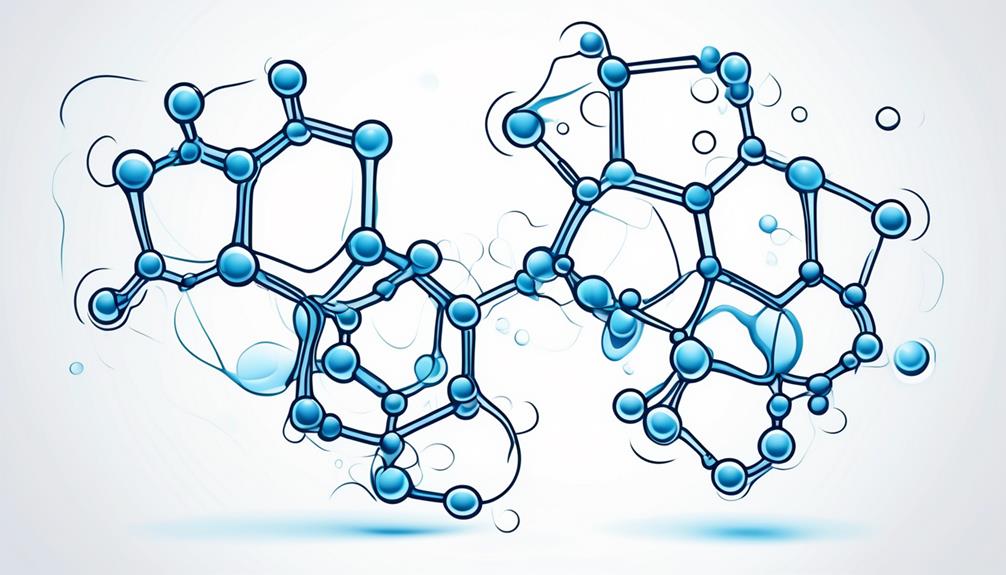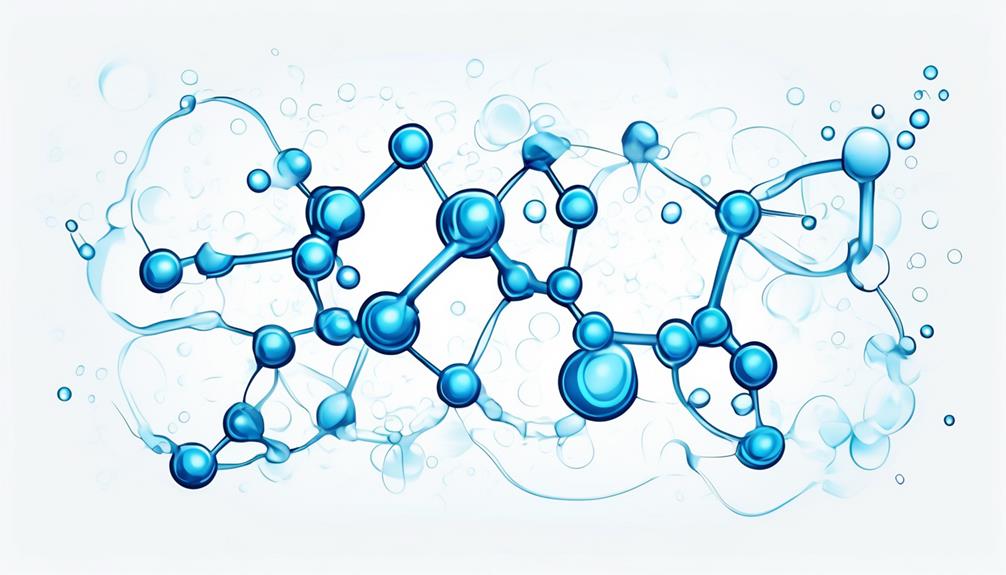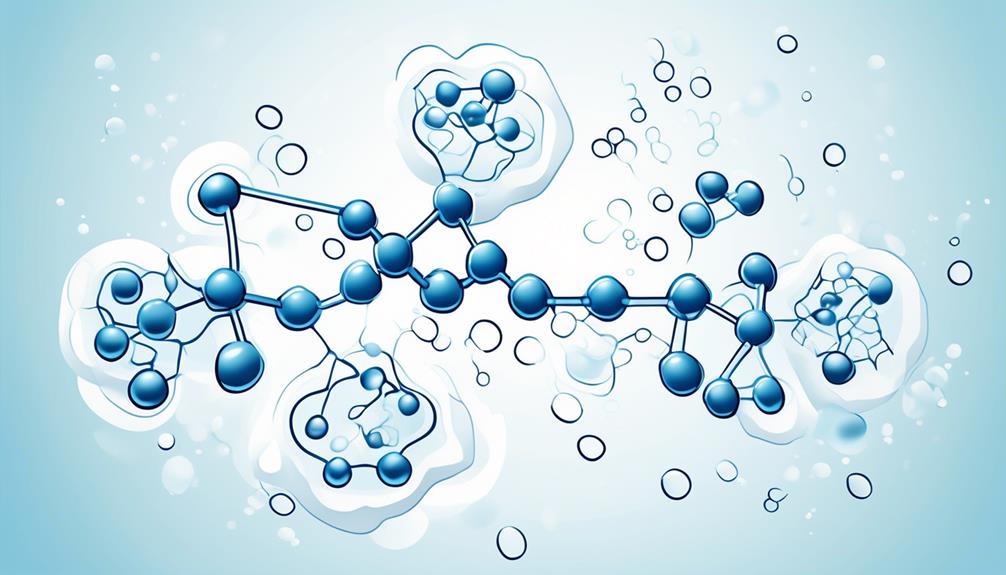You may have noticed that hydrogen bonds play a rather important role in water chemistry.
But have you ever wondered why they hold such significance?
Well, these bonds have a remarkable ability to influence the behavior of water molecules in ways that are truly fascinating.
As you consider the impact of hydrogen bonds in water chemistry, you'll discover a whole new world of understanding about the essence of this simple yet extraordinary substance.
Key Takeaways
- Hydrogen bonds in water chemistry are essential for the dissolving ability of water and its role in biological processes.
- The formation of hydration shells around solute particles is crucial for various biological functions.
- Water's polarity and hydrogen bond formation play a significant role in moderating temperature changes, impacting environmental stability and biological functions.
- Understanding the contributions of hydrogen bonds to water's structure and properties is key to appreciating the physical and chemical properties of water.
Polarity of Water Molecules
Understanding the polarity of water molecules is crucial for comprehending many of water's unique properties. Water molecules are made up of two hydrogen atoms and one oxygen atom, forming a V shape. Due to the difference in electronegativity between oxygen and hydrogen, water is considered a polar molecule. This polarity results in the oxygen atom having a partial negative charge, while the hydrogen atoms carry partial positive charges.
Hydrogen bonding, a type of intermolecular force, plays a significant role in the behavior of water molecules. The positively charged hydrogen atoms are attracted to the negatively charged oxygen atoms of neighboring water molecules, creating hydrogen bonds. These bonds are essential in many aspects of water chemistry, such as its high surface tension, cohesion, and adhesion properties.
The polarity of water molecules also enables them to dissolve various substances, making water a universal solvent. The ability of water to form hydrogen bonds with other polar or charged molecules allows for the transportation of nutrients and waste within living organisms. Overall, understanding the polarity of water molecules is fundamental in grasping the unique characteristics and functions of water in chemistry.
Formation of Hydrogen Bonds
With the polarity of water molecules attracting neighboring atoms, the formation of hydrogen bonds becomes a crucial aspect to explore in water chemistry. These hydrogen bonds play a vital role in holding water molecules together, leading to the unique properties of water that make it essential for life and various processes.
Importance of Hydrogen Bonds in Water Chemistry:
- Stability: Hydrogen bonds form between the positively charged hydrogen atoms of one water molecule and the negatively charged oxygen atoms of another, providing stability to the overall structure of liquid water.
- Surface Tension: The cohesive forces created by hydrogen bonds result in high surface tension in water, allowing certain insects to walk on water without sinking.
- Heat Capacity: Hydrogen bonds contribute to water's high specific heat capacity, enabling it to absorb and retain heat effectively, thereby helping to regulate temperature in living organisms and environments.
Number of Hydrogen Bonds in Water
When you consider the number of hydrogen bonds in water, you'll find that each water molecule can form up to four hydrogen bonds.
This unique ability allows water to create intricate networks of intermolecular connections.
Understanding how these hydrogen bonds contribute to the overall structure and properties of water is fundamental in water chemistry.
Bonding in Water
Hydrogen bonds play a crucial role in the chemistry of water by facilitating interactions between water molecules. Here's why the number of hydrogen bonds in water is significant:
- Dual Role: Each water molecule can form up to four hydrogen bonds, acting as a bridge between different molecules.
- Stability: These bonds contribute to the unique properties of water, such as high surface tension and specific heat capacity.
- Polarity: The polarity of water molecules enables them to form hydrogen bonds, creating a cohesive network within the liquid.
Understanding the number of hydrogen bonds in water sheds light on its behavior and the essential role these bonds play in the physical and chemical properties of water.
Hydrogen Bond Formation
To understand the significance of hydrogen bond formation in water, consider its impact on the behavior and properties of this essential liquid. Water molecules can form hydrogen bonds due to the polar nature of the molecule, leading to several unique properties. In a water molecule, each hydrogen atom can form a hydrogen bond with an oxygen atom from a neighboring molecule. This results in a network of hydrogen bonds that give water its high surface tension, cohesion, and ability to moderate temperature. The number of hydrogen bonds in water contributes to its remarkable ability to dissolve a wide range of substances, making it a universal solvent. This hydrogen bond formation is fundamental to the exceptional characteristics that define water's importance in chemistry.
| Water Properties | Description |
|---|---|
| Surface Tension | High surface tension due to the cohesive forces between water molecules. |
| Cohesion | Cohesion is the attraction between water molecules due to hydrogen bonds. |
| Temperature Moderation | Ability to moderate temperature due to the energy required to break hydrogen bonds. |
| Solvent Ability | Excellent solvent properties because of the ability to form hydrogen bonds with solutes. |
Bond Strength in Water
The strength of bonds in water, particularly the number of hydrogen bonds formed, plays a vital role in shaping the unique properties of this essential liquid.
Here's why the number of hydrogen bonds in water is crucial:
- Each water molecule can form up to four hydrogen bonds, leading to the formation of intricate networks within the liquid.
- The presence of hydrogen bonds gives water its high heat of vaporization, which is essential for moderating temperature changes in living organisms and maintaining stable environments.
- These hydrogen bonds also contribute to water's properties as a versatile solvent, allowing it to dissolve a wide range of substances due to its polar covalent bond interactions.
Effects of Hydrogen Bonding

Understanding how hydrogen bonding influences the properties of water is crucial for comprehending its significance in chemistry. Hydrogen bonds between water molecules create a cohesive network responsible for many of water's unique characteristics. One key effect of hydrogen bonding is the high specific heat capacity of water, which means it can absorb a lot of heat energy before its temperature rises significantly. This property is essential for regulating temperature in living organisms and aquatic environments.
Moreover, as a polar molecule, water exhibits strong adhesion to other substances due to hydrogen bonding. This adhesion allows water to climb up narrow tubes, a phenomenon known as capillary action, which is vital for plant hydration and nutrient transport.
Importance in Biology
Hydrogen bonding's pivotal role in water chemistry extends significantly into the realm of biology, impacting various essential processes and structures crucial for life.
Importance in Biology:
- Biological Solvent: Hydrogen bonds in water allow it to dissolve and transport essential biological molecules and ions, facilitating metabolic reactions and nutrient distribution within living organisms.
- Temperature Regulation: The hydrogen bonding in water contributes to its high specific heat capacity, aiding in maintaining stable temperatures within organisms, which is vital for biochemical reactions to occur optimally.
- Biological Processes: Cohesion and adhesion resulting from hydrogen bonding are critical for biological processes like plant water uptake and blood circulation in animals, ensuring nutrients and oxygen are efficiently transported throughout the body.
These vital biological functions are made possible by the unique properties of water molecules, driven by the presence of hydrogen bonds that make water a polar molecule essential for life's processes, such as maintaining DNA structure, protein stability, and cellular functions.
Solvent Property

Let's talk about how water's dissolving ability makes it a fantastic solvent, allowing it to dissolve a wide range of substances.
Additionally, water's capability to form hydration shells around ions plays a crucial role in various chemical reactions and biological processes.
The interactions between water molecules and polar compounds are essential for maintaining the balance of life-sustaining processes.
Water's Dissolving Ability
Playing a crucial role in water chemistry, the solvent property of water allows it to dissolve a wide range of substances effortlessly. When a substance is added to water, the water molecules surround the individual molecules of the substance. This surrounds the substance molecules and breaks the hydrogen bonds between them. Here's why water is such a good solvent:
- Hydrogen Bonds: Water can form hydrogen bonds with substances, enabling it to dissolve them effectively.
- Surrounding Molecules: Water molecules surround the individual molecules of a substance, facilitating their dissolution.
- Breaking Bonds: Water disrupts hydrogen bonds within a substance, aiding in its dissolution.
Water's ability to dissolve various substances is crucial for many biological processes and everyday applications.
Hydration Shell Formation
Water's ability to form hydration shells around solute particles is a key aspect of its solvent property, essential for various biological processes. When solute particles enter water, the partially negative oxygen atom of water molecules attracts them, forming hydrogen bonds. This attraction leads to the surrounding of solute particles by water molecules, creating hydration shells.
These hydration shells enable solutes to dissolve in water, facilitating chemical reactions within living organisms. The formation of hydration shells is a direct result of water's unique cohesive and adhesive properties, making it an effective solvent. Understanding how hydrogen bonds between water molecules and solutes contribute to hydration shell formation is crucial for comprehending the fundamental role of water in biological systems.
Polar Molecule Interactions
Why are polar molecule interactions essential for water's solvent property in biological systems?
In water chemistry, polar molecules play a crucial role in the formation of hydrogen bonds, which are vital for various biological processes. Here's why these interactions are significant:
- Hydrogen Bonds: Polar molecules, like water, can form hydrogen bonds with other polar molecules or electronegative atoms, allowing for the dissolution of various solutes.
- Solvent Property: Water's polarity enables it to surround and dissolve charged or polar solutes, facilitating chemical reactions and biological processes in living organisms.
- Intermolecular Interactions: The ability of polar molecules to interact with each other through hydrogen bonding creates a dynamic environment that supports essential biological functions.
Moderation of Temperature

When considering the moderation of temperature, the role of hydrogen bonds in water chemistry becomes apparent in how they slow down molecular movement. These hydrogen bonds are crucial in moderating temperature by affecting the heat capacity of water. The table below summarizes the key aspects of how hydrogen bonds influence the moderation of temperature.
| Aspect | Influence of Hydrogen Bonds |
|---|---|
| Heat Capacity | High specific heat capacity due to hydrogen bonds minimizes temperature changes by absorbing heat energy. |
| Kinetic Energy | Hydrogen bonds restrict molecular movement, reducing kinetic energy and preventing rapid temperature fluctuations. |
| Moderation | Hydrogen bonds contribute to temperature moderation by stabilizing water's temperature and resisting extreme changes. |
In essence, hydrogen bonds play a vital role in moderating temperature by influencing the heat capacity of water, reducing kinetic energy, and stabilizing temperature fluctuations. This moderation effect is vital for various biological processes and environmental stability.
Cohesion and Surface Tension
Frequently, hydrogen bonds between water molecules create cohesion, allowing them to stick together and form droplets. This cohesive property stems from the bonds within water and plays a critical role in the concept of surface tension.
Here are some key points to consider:
- Cohesion: Hydrogen bonds pull water molecules together, creating a force that keeps them united. This cohesion is why water droplets form and why water can flow smoothly without breaking apart easily.
- Surface Tension: The surface tension of water is a result of hydrogen bonds pulling water molecules at the surface closer together than those in the bulk of the liquid. This tension allows water to support small objects on its surface, like tiny insects, without sinking.
- Significance: Understanding how hydrogen bonds contribute to cohesion and surface tension in water is crucial in various fields, from biology to physics. These properties not only shape the behavior of water but also impact biological processes and everyday phenomena we observe.
Frequently Asked Questions
Why Is a Hydrogen Bond Important in Water?
In water, a hydrogen bond is crucial since it helps molecules stick together, creating surface tension and allowing water to form unique properties like cohesion, adhesion, and high specific heat capacity.
Why Is Hydrogen Bonding Important in Chemistry?
Hydrogen bonding is crucial in chemistry because it influences molecular structure, properties, and interactions. It helps stabilize molecules, affects boiling points, and contributes to the unique characteristics of substances. Understanding it enhances your grasp of chemical processes.
What Will Happen if There Is No Hydrogen Bonding in Water?
If there were no hydrogen bonding in water, molecules wouldn't stick together as tightly. Water would boil at a much lower temperature, affecting everyday activities like cooking and hygiene. Your life would be noticeably different without hydrogen bonds in water.
What Is the Most Important Role of Hydrogen Bonding Between Water Molecules?
In water, hydrogen bonding plays a crucial role in maintaining the unique properties of water, like cohesion and surface tension. It helps water molecules stick together, creating a strong and stable structure.
Conclusion
So, in a nutshell, hydrogen bonds in water chemistry are kind of a big deal. They give water its special properties like high specific heat capacity, great solvent abilities, and even help support life on Earth.
Without these little bonds, water wouldn't be the amazing molecule that it is. So, next time you take a sip of water, remember to thank those hydrogen bonds for making it all possible!
